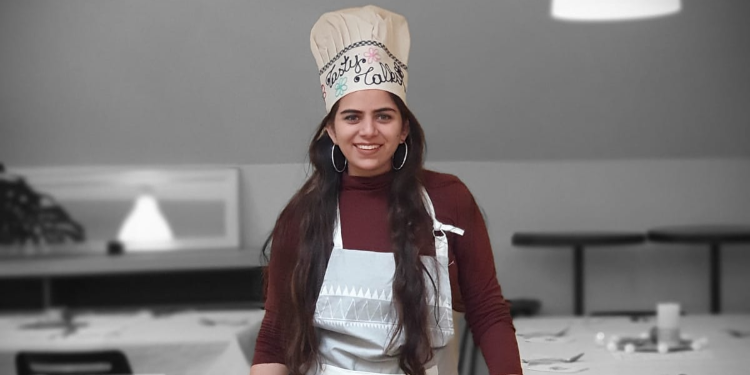
“If you share food, you end up sharing emotions.” Meet the lady who piques your culinary interest not just through food, but also an emotional connect. Manasi, from India, arrived in Amsterdam in 2018. Within six months, she was running her own business; a social dining platform that brings people together over authentic cultural food meet-ups, culinary tours and experiences as well as through online cooking workshops in a unique setting of people’s own homes. The idea is to enable people to experience authentic cultural dining.
In a short span of 18 months, her business boasts of a stellar event host community with over 30 hosts, more than 5,000 followers, and nearly 200 culinary experiences within the Netherlands. The audience is mainly international locals, expats and foodies, who are looking for authentic culinary and experiences and social connections and identify themselves as global citizens.
Her inspiration
It all started one rainy evening when Manasi got a craving for Indian "pakodas" with her evening tea. It wasn't too long she had left Indian shores, where food is more of an emotion and experience.
“In India nobody goes to a hotel to eat Pakoras. They are supposed to be enjoyed with chit chat at home or by the street vendor who serves them fresh off the kadhai(wok)”
She thought of sharing this experience with others, and that's how her business was born, first, at her own home and then through her close-knit network of hosts.
Inception
As soon as Manasi conceptualised her business, she created an event on Facebook and invited people who wanted to indulge in an authentic Indian culinary experience. She quickly got two people who were her first customers at her place for a treat of Pakodas. The event was just 7 euros but an encouraging start. Then began a monthly event schedule at her place where she would charge a small fee for simple home-cooked Indian food. That was the year 2018. In 2019, she started recruiting hosts, basically passionate chefs, who were interested in conducting similar events. Her first host was a Bhutanese lady, who started her momos business effectively with Tasty Talks and now runs a food truck of her own.
Initial struggle
None of the successful ventures has come of age without their due share of struggles. Manasi also had to sweat out while finding her initial set of customers. She would go to all the networking events, join all the relevant groups in the meetups and on Facebook. She has attended random meetings even if she wasn't interested, with a sole aim of finding leads or clients and understanding the people of the city. Her efforts did prove fruitful and soon, hosts and customers trickled in. Momos workshops were the ones which attracted most of the crowd.
Challenges
One of the major challenges of a food business is its cyclic nature. It wasn't any different for that of Manasi. While it was a full house in winters, the summers were quite slow as people preferred outdoors. But this didn't deter her. The summer of 2019 went in building more connections and network, preparing for a scale-up.
By the summer of 2020, the sharing economy was already down due to Covid situation. And that's when Manasi pivoted to Online cooking classes. By the time situation eased up, she also began experimenting with outdoor events in the form of picnics and potlucks in the lovely parks.
She was also bothered sometimes about the competition. However, keeping a razor-sharp focus, she managed to create her own niche by nurturing relationships with her clients and hosts, since this is a very relationship-oriented field. She was able to maintain the quality of her events, by onboarding the best of hosts who thoroughly enjoyed working with her and through a formal feedback mechanism.
The best moments
The best part of the experience for the people is not just the authentic culinary experience, but also the vibes and relationships that they build for a lifetime. Many people have even found their business associates through these events. And that's the reason why it has a huge base of loyal customers. In fact, one of the couples has attended all their online events. This is a matter of huge pride for the company.
“The best moment has to be the celebratory 100th event of Tasty Talks” chuckles Manasi. It coincided with Women's day and 6 lady chefs took charge of preparing the awesome food from different cuisines hosted in a kitchen studio, it saw a massive attendance by 50 people. It was definitely a treat and a unique experience for everybody to take back home, also one of its kind celebrating the coming together of women in cooking (also a profession where women are underrepresented).
What next?
Since, the business has its foundations in relationship building, Manasi sees an organic growth for the next couple of years. She plans to expand to various cities in Netherlands, and also branch out online, ensuring that the experience doesn't lose its essence. Meanwhile, she is also experimenting with different formats for the social dining experience like pop-ups, storytelling with food, music and food, paint and eat nights, food tours and so on.
Her message for aspiring entrepreneurial expats
“I always believe that as an expat, one has a huge opportunity to make a new life and do whatever one wants. It may not come easy, but the excitement of building something from scratch in a totally new place with no absolutely zero social capital can be a real game-changer in an expat's journey. I urge aspiring expat entrepreneurs to calculate their risk and just take the plunge. Listen to your audience, rely on feedback and data and invest in and nurture your clients. It helps immensely to know your first 100 customers. They come back to you if you make them happy. Most importantly, be patient. Rome was not built in a day!”



















